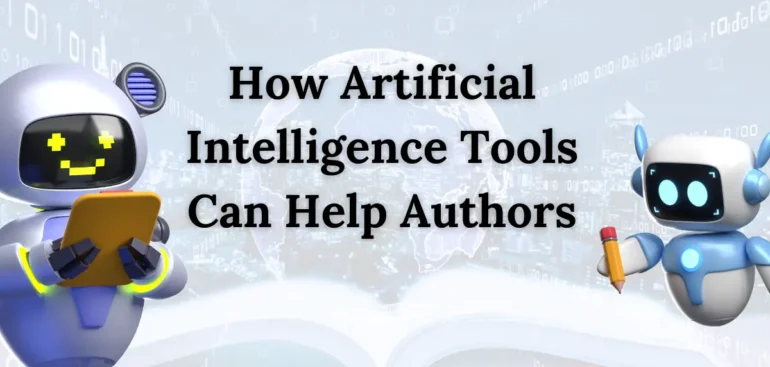With the introduction of Artificial Intelligence (AI) tools, the writing field has experienced a profound transformation. Nowadays, authors can choose from a wide range of AI-powered tools that improve the caliber and inventiveness of their writing and streamline the writing process. Let’s explore how AI tools can revolutionize the writing industry and how authors can use them to improve their productivity and craft. Unleashing AI’s Potential Transforming Authors’ Writing
The Development of AI Compositional Instruments
AI writing tools, driven by complex algorithms, are intended to improve writers’ talents across various writing domains. These tools, which use Natural Language Processing (NLP) algorithms, provide a range of functions to enhance and streamline written text.
Prompt-Oriented Production
One of AI writing tools’ distinguishing characteristics is its prompt-based creation method. Writers merely offer a topic or query, and artificial intelligence algorithms interpret it to produce pertinent content in various forms, including essays, blog entries, and even short tales.
Correction of Grammar and Syntax
Artificial intelligence tools serve as observant protectors of syntax and grammar, quickly identifying and fixing mistakes in real time. This quick feedback loop not only boosts the quality of writing but also serves as a significant learning resource for authors.
Content Development
AI technologies leverage data analytics to optimize content for target audiences. Writers may optimize their material for optimum readability and engagement by examining trends and SEO factors.
Concept Generation
It is common for writers to struggle to overcome writer’s block, but AI tools can help by offering ideas and inspiration. This functionality fosters creativity and empowers authors to explore new narrative avenues.
Efficiency and Consistency
AI tools give writers back valuable time by automating repetitive tasks like research, summarization, and content creation. This allows them to concentrate on more complex aspects of writing and guarantees consistency in tone, style, and messaging across different content pieces.
AI Writing Tools’ Advantages for Writers
The use of AI writing tools heralds a new era of efficiency, originality, and excellence in the world of composition. Now let’s examine the numerous advantages that writers can experience by incorporating these tools into their workflow:
Increased Productivity and Efficiency
AI tools streamline mundane tasks like grammar checking and proofreading, enabling authors to allocate their time more effectively. Thanks to this productivity boost, authors can explore the creative process more deeply.
Stimulated Idea Generation
AI tools help writers overcome writer’s block and act as catalysts for idea generation. By offering topics and approaches, these tools motivate authors to explore unknown realms of imagination.
Elevated Quality of Writing
AI’s excellent attention to detail gives authors insightful criticism of their work, allowing for improvement and polish. Artificial intelligence (AI) guarantees that every piece of content satisfies the highest quality standards, from error detection to stylistic enhancements.
Tailored Content Optimization
In today’s digital landscape, audience engagement is paramount, and AI tools excel at optimizing content for maximum impact. By examining SEO criteria and reader preferences, writers may craft content that engages and connects with their audience.
Strong Plot and Character Development
AI tools help writers develop complex plotlines and fully realized characters that readers will find engaging. Authors can add depth and authenticity to their narratives by creating original plot elements and utilizing well-established literary standards.
Language Refinement and Adaptation
AI tools offer a myriad of linguistic enhancements, from vocabulary suggestions to tone adjustments, enabling authors to fine-tune their prose for different genres and audiences.
Exploring AI Writing Tools for Authors
Writers can choose from various AI writing tools tailored to theirts and tastes. Here are some notable options worth exploring:
Sudowrite
Tailored for fiction authors, Sudowrite boasts a robust suite of features encompassing brainstorming, research, character building, and editing. With its versatility and genre-agnostic approach, Sudowrite is a favorite among authors across various literary landscapes.
Claude
As a newcomer in AI writing, Claude has quickly garnered attention for its prowess in language generation and creative writing tasks. Authors seeking innovative solutions for their narrative endeavors find Claude a valuable ally.
ChatGPT Plus
ChatGPT Plus is an incredibly versatile language model powered by OpenAI’s GPT-3. While not exclusive to fiction, it proves instrumental in generating ideas, crafting character dialogues, and devising plot twists.
OpenAI Playground
For authors keen on exploring the capabilities of GPT-3, the OpenAI Playground provides a sandbox environment for experimentation and creative imagination. Even though it’s not a writing tool, it’s an excellent place to start exploring how AI can be used to write.
Best Practices for Harnessing AI in Writing
Following best practices is essential as authors use AI-driven writing to guarantee that these technologies are used ethically and effectively. Here are some pointers to think about.
Maintain Your Voice
Even though AI tools are beneficial, it’s crucial to maintain your unique writing voice and style throughout the composition process. Strive for a harmonious blend of AI-generated content and personal expression to uphold the authenticity of your work.
Embrace Transparency
It would help if you were upfront about using AI-generated text in your manuscript, especially when communicating with readers and publishers. Open communication fosters honesty and integrity in the literary community.
Navigate AI Limitations
Recognize the inherent limitations of AI tools, particularly in grasping contextual nuances and cultural sensitivities. Please exercise caution when relying on AI for essential work areas and enhance its output with human insight.
Safeguard Against Plagiarism
It is crucial to exercise caution to prevent unintentional plagiarism while using AI-generated content. Always verify the originality of AI-generated material and take proactive measures to uphold ethical standards in your writing.
Observe Summaries Generated by AI
Stay vigilant against unauthorized or misleading AI-generated book summaries that may surface on platforms like Amazon. Prompt action ensures the integrity of your literary works and protects against misrepresentation. Unleashing AI’s Potential Transforming Authors’ Writing
Ethical Utilization of Generative AI
When incorporating generative AI into your writing process, be mindful of the risks involved and prioritize ethical considerations. Responsible usage preserves the sanctity of creative expression while harnessing AI’s transformative potential.
Embracing AI: A Gateway to Enhanced Authorship
In conclusion, integrating AI writing tools represents a paradigm shift in the landscape of authorship, empowering writers with newfound efficiency, creativity, and quality. By adopting AI sensibly and ethically, writers open up opportunities that improve their work and increase their influence. Join the Writers’ Connection now to start a journey of transformation driven by teamwork and creativity. Follow us on social media for the newest information on trends, insights, and networking opportunities. Unleashing AI’s Potential Transforming Authors’ Writing



